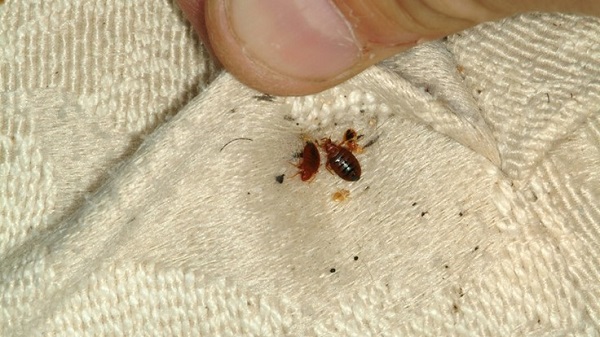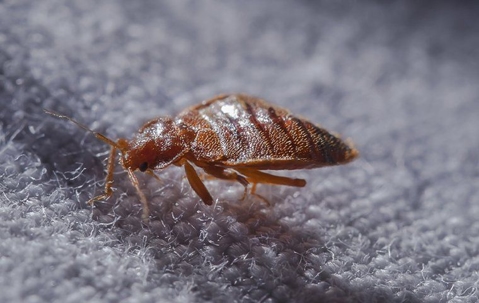Amazing Bed Bug Exterminator Treatment in Houston: Specialist Take Care Of Your Home
Amazing Bed Bug Exterminator Treatment in Houston: Specialist Take Care Of Your Home
Blog Article
Reliable Pest Control Steps to Secure Your Garden and Plants
In the realm of horticulture, the harmony of a well-tended yard can usually be interrupted by undesirable insects that intimidate the health and vigor of plants. Applying effective parasite control measures not just safeguards the garden's aesthetic charm but likewise plays a pivotal function in maintaining the plants' health.
All-natural Pest Repellents

Another efficient natural bug repellent is diatomaceous earth, a grainy compound made from fossilized marine microorganisms. Diatomaceous earth works by physically damaging pests with its unpleasant structure, making it an excellent alternative for regulating bugs like slugs, beetles, and caterpillars. Furthermore, planting companion plants like marigolds, lavender, or basil can aid repel parasites as a result of their strong fragrances or natural chemical substances.
Beneficial Insects for Bug Control

One more beneficial bug is the parasitical wasp, which lays its eggs inside bug insects, at some point killing them. Ground beetles are exceptional for controlling caterpillars, snails, and slugs. Hoverflies, often mistaken for bees because of their comparable appearance, eat aphids, thrips, and caterpillars.
To bring in advantageous insects to your yard, you can grow a varied series of flowering plants, such as dill, fennel, and yarrow, which offer nectar and plant pollen for adult bugs. In addition, avoid using broad-spectrum pesticides that can hurt both damaging and valuable insects. By creating a welcoming setting for these useful bugs, you can lower the need for chemical pesticides and promote a healthier, a lot more balanced garden environment.
Friend Growing Strategies
When aiming to improve the performance of beneficial insects in your garden for natural bug control, taking into consideration companion planting techniques can even more enhance the ecosystem equilibrium. Friend planting involves strategically positioning certain plants next to each various other to optimize their mutual benefits, such as deterring parasites, bring in like this beneficial bugs, or improving nutrition uptake - bed bug exterminator houston near me. One prominent instance is planting marigolds alongside tomatoes to ward off nematodes and other unsafe pests while additionally bring in pollinators
Growing trap plants like nasturtiums can draw away parasites away from your primary crops, offering as sacrificial plants that protect your useful fruit and vegetables. By carrying out companion growing strategies, you can produce a varied and harmonious yard ecological community that naturally regulates insects while advertising plant health and efficiency.
Do It Yourself Insect Control Solutions
To effectively manage pests in your garden, applying do-it-yourself bug control remedies can be an economical and eco-friendly method. One usual DIY insect control option is producing self-made insecticidal soaps by blending mild soap with water to manage soft-bodied pests like aphids, termites, and whiteflies. Furthermore, introducing helpful pests such as ladybugs, lacewings, and predative wasps can aid normally control bug populations in your garden. Establishing physical obstacles like row covers or netting can additionally protect against pests like caterpillars from harming your plants.
Another effective technique is utilizing diatomaceous earth, a natural powder that can be sprinkled around plants to deter slugs, snails, and other crawling insects. Friend planting certain herbs and blossoms like marigolds, basil, and lavender can aid drive away pests and draw in useful bugs. On a regular basis inspecting your plants for indications of pest damages and without delay removing any influenced locations can likewise prevent problems from dispersing. By integrating these DIY parasite control options into your horticulture regimen, go right here you can safeguard your wikipedia reference garden and plants without counting on extreme chemicals.
Environmentally-Friendly Pesticides

One more efficient option is diatomaceous earth, a natural substance made from fossilized aquatic organisms, which can be sprayed around plants to manage slugs, snails, and other crawling insects. Furthermore, insecticidal soaps and oils obtained from plant-based sources serve for regulating soft-bodied bugs like aphids, mites, and whiteflies.
Verdict
To conclude, reliable bug control actions such as natural repellents, helpful pests, buddy planting strategies, do it yourself services, and environmentally-friendly pesticides are important for safeguarding your yard and plants. By carrying out these methods, you can protect against damage caused by pests and preserve a healthy and successful garden ecological community. It is necessary to think about the long-term influence of using chemicals and select even more sustainable and environmentally friendly alternatives to make sure the health and wellness of your plants and the setting.
Report this page